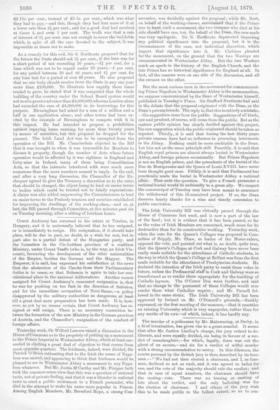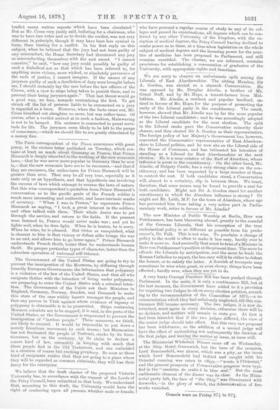The murder of a policeman by Mr. Mainwaring, at Derby,
in a fit of intoxication, has given rise to a great scandal. It seeTri$5 that after Mr. Justice Lindley's charge, the jury retired to de- liberate, and were equally divided, six being in favour of a ver- dict of manslaughter,--for which, legally, there was not the ghost of an excuse,—and six for a verdict of wilful murder with a strong recommendation to mercy. In this dilemma, the course pursued by the British jury is thua described by its fore- man :—" We had not then elected a chairman, and 1, as fore- man, declined to act as such, and it was agreed to ballot for one, and the vote of the majority should rule the verdict ; and that in case of equal numbers, the chairman should have the casting - vote. There was no tossing or meting of lots about the verdict, and the only balloting was for the election of chairman. I and others of the jury wish this to be made public to the fullest extent, so as to con- tradict many untrue reports which have been circulated." But as Mr. Cross very justly said, balloting for a chairman, who was to have two votes and so to decide the verdict, was not very 'different in principle, though it may have been lees cynical in form, than tossing for a verdict. In his first reply on this subject, when he believed that the jury had not been guilty of any misconduct, the Home Secretary had threatened any jury so misconducting themselves with fire and sword. "I cannot conceive," he said, "how any jury could possibly be 'guilty of such a diabolical act as that which has been referred to, for anything more vicious, more wicked, or absolutely perversive of the ends of justice, I cannot imagine. If the names of any jurymen guilty of such a dereliction of duty were brought before me, I should certainly lay the case before the law officers of the Crown, with a view to steps being taken to punish them, and to prevent their being jurymen again." That last threat would go a good way, we fear, towards neutralising the first. To get struck off the list of persons liable to be summoned on a jury is regarded as a boon. However, when the facts came out, Mr. Cross breathed out slaughter no more, but was rather tame. Of course, after a verdict arrived at in such a fashion, Mainwaring is not to be hanged. His sentence is commuted to penal servi- tude for life. The jurymen seem likely to be left to the pangs
conscience,—which we should like to see gently stimulated by a money fine.



































 Previous page
Previous page